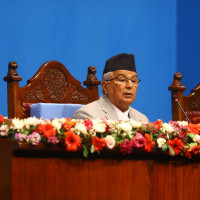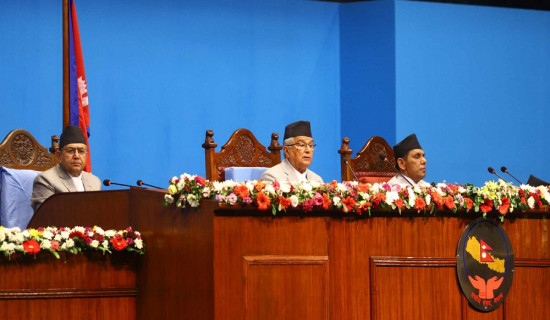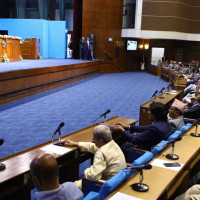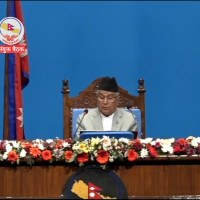- Saturday, 3 May 2025
Dhobis forced to wash their hands off laundry business
BY SUSHMA MAHARJAN,Kathmandu, Apr. 26: Once, only people from the Dhobi community delivered laundry services in Kathmandu. Kiran Maghaiya, chairman of Rajak Samudaya Bikas Sangh, said that during the reign of King Hari Simha Dev in the 14th century, the people of Kathmandu were classified on the basis of their occupation. Those who offered the laundry services were called Dhobi, mostly including Newars with castes Maghaiya, Rajak, Kanaujiya, Mashal and others.
At present, many people of different ethnicities and castes have started doing laundry businesses since one can make a good living from this.
Maghaiya, who is the fifth generation of the family to continue the ancestral occupation, informed that one family could earn from Rs. 150,000 to Rs. 200,000 per month during good season from the business. For them, the season of wedding, tourism and winter are the best times to earn well.
He said that in the past, the community used to pick up laundry from Ranas, royal families and high-society people. Now, hotels, restaurants, hospitals and trekking companies are the major clients in the business, he added. Naradevi, Dalkho, Lainchaur, Swayambhu, Lazimpat, Tamsipakha are some locations where Dhobis resided and Dhobichaur in Kathmandu and Dhobighat in Patan were two places that had been named after this community, he said.
Maghaiya, a resident of Dhobichaur, informed that almost 95 per cent of the Dhobi community which includes around 150 families living at Dhobichaur were still in the laundry business.
However, since this was the caste-based occupation and many people looked down upon them, new generations had started choosing alternative professions, he said.
Sabitri Rajak, 45, who had been doing laundry since her childhood, informed that she did not expect her daughter, who is studying at college now, to continue the business. She said that necessary chemicals, detergents, soaps, new-tech machineries, irons were easily available today which had made her easy to do the laundry.
Recalling that her father used to prepare needed supplies from raw materials like rithha, ash and used firewood to prepare steamer, she said over time this business had become easier. But the occupation is taken as a caste-based occupation which did not give them proper recognition in the society, she added.
According to chairman Maghaiya, though the elder family members had been continuing with this occupation, many youths had taken different careers. Hence, once the caste-based occupation is now being carried on by others as well.
While walking nearby the Dhobi residences and Thamel area in Kathmandu, we can see many laundry services provided by non-Newars. One can even avail of services online.
Maghaiya explains that due to unequal behaviour in the society and challenges in the business, the community had slowly started leaving the business despite earning handsome amount of money.
He said that since many natural water resources had dried up they had to buy water in the past but now the Melamchi Water Supply Project provides enough water to run the business.
But, many open spaces to dry laundry have been encroached and still they are taken as low caste people, he said, and added if people would recognise the caste-based occupation just as a means to generate income and do business, they could revive the interest of the youths in the business.

















